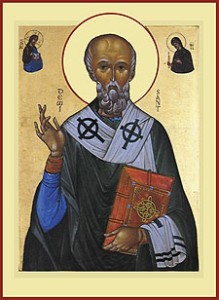 On March 1st the Orthodox Church commemorates Saint David, the patron saint of Wales. He was born in about 487, on the southwestern coast of the country.
On March 1st the Orthodox Church commemorates Saint David, the patron saint of Wales. He was born in about 487, on the southwestern coast of the country.
His birth is traditionally believed to be the result of rape. His mother Nonita, who is also honored by the Church, was the daughter of a local chieftain, and often in the company of nobles and princes. One prince found her irresistibly attractive, and forcibly seduced her. She is said to have given birth to David in a raging storm, perhaps reflecting the violent nature of his conception.
David was raised in the Welsh Church, and educated by clergy. His teachers were urgently aware of the need to take Christianity to the farther reaches of Wales and England. They recognized David’s outstanding ability to speak with eloquence about the faith, and to engage the minds and hearts of people listening to him. This was why, in later years, he would be a convincing opponent of the Pelagian heresy. But as a student he was already seen as an excellent candidate to do missionary work, a ministry he undertook soon after his formal education was completed.
Saint David’s missionary travels ranged over Wales, western England, and Brittany. He founded several monasteries in southern Wales. They were noted for the extreme austerity of their practices, modeled on David’s understanding of the life of the early desert monastics.
A description of the monks’ daily lives was recorded by an eleventh-century writer named Rhygyvarch (spelled in various ways), who based his life of David on “many old manuscripts” in the saint’s monastery at Menevia. It is the only extensive record of David’s life that we have. Rhygyvarch writes that after a full day of work plowing and planting, done without the aid of oxen or any animals, the monks stood in chapel for several hours of prayer, ending with chanted Psalms: “When the chanting of the Psalms is done…they worship on bended knees until the stars are seen in heaven bringing the day to a close. The father [David] alone, after having gone out, pours forth a prayer in secret to God for the state of the Church.”
The monks’ meals were simple, and accompanied only by water:
“Not dishes of various tastes lie before them or too dainty provisions, but having fed on bread and herbs seasoned with salt, they may assuage ardent thirst with a temperate sort of drink. On that occasion they provide for the sick and those advanced in age, and even those wearied with a long journey, some refreshments of a more appealing sort, for one must not weigh out to all in equal measure.”
David’s last words to the monks gathered around his deathbed included these: “Do the little things.” These words are a reminder of the words of Christ Himself, read two Sundays ago. Jesus’ surprised listeners asked Him when they seen Him in need or distress, and ministered to Him. He answered, “As you did it to the least of these, you did it to Me” (Matthew 25: 40).
